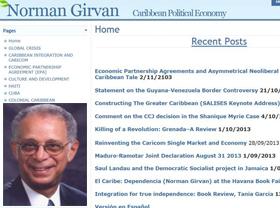Norman Girvan: Pragmatic economist

Jamaican political economist Norman Girvan has died at the age of 72.
He had been hurt in a fall while hiking in Dominica in January 2014. He had been airlifted to Martinique and then taken to Cuba where he died on 9 April.
Prof Girvan’s influence in Caribbean economics was huge. You don’t have to have moved in Caribbean academic circles to have benefited from the work he did during his regional and global career.
His achievements included paving the way for the development of the Caricom trade bloc. He literally wrote the roadmap to move Caricom from a single market to a single economy.
In his vision outlined in the Girvan Report, he saw Caricom achieving a single economy by 2015. Caricom leaders accepted the report in 2007.
While that goal might not yet have been met, parts of the Girvan project – extending the free movement of labour, streamlining Caribbean human and financial resource-sharing – can all be found embedded in Caribbean countries’ national development plans over the years.
As University of the West Indies (UWI) Prof Neville Duncan said on Jamaica’s Nationwide Radio after his death, Norman Girvan was “deeply theoretical but astoundingly practical”.
Background
Prof Girvan received many honours and awards for his contribution to Caribbean intellectual and political thinking.
He was Professor Emeritus of the University of the West Indies (UWI) up to the time of his death, but his work spanned global development policy beyond the Caribbean.
Caricom’s Secretary General, Irwin LaRocque, said in a statement: “Girvan’s ideas and ideals placed him in the upper echelons of Caribbean intellectuals.”
Mr LaRocque added that Prof Girvan’s life’s work showed his “unremitting dedication to a vision of an integrated Caribbean”.
Professor Girvan’s website, Caribbean Political Economy, reflected the areas in which he made his most lasting contributions to modern Caribbean development.
The outpourings on social media on Wednesday night and Thursday morning following his death indicated that his reputation went beyond the academic community to wider Caribbean and international circles.
From 60s London to 2013 campaigning
Norman Girvan was a graduate of the University College of the West Indies and the London School of Economics. In the 1960s, he was a member of the CLR James study group in London that also included Walter Rodney.
Returning to the Caribbean, he worked on national planning in Jamaica and went on to serve as secretary general of the Association of Caribbean States (ACS) and a member of the UN Committee on Development Policy.
In 2010, he was appointed as the UN Secretary General’s Personal Representative on the Guyana-Venezuela border dispute.
Girvan the campaigner
His campaigning throughout his career ranged from Caricom integration to the betterment of the Haitian people.
In one of his last email messages on 17 December 2013, shared with Caribbean Intelligence© and other media houses to which he used to circulate his papers, his thoughts were on Haitian people in the Dominican Republic.
The topic was the “Denationalisation of Dominicans of Haitian descent”, written by a colleague at the Institute of International Relations.
But Norman Girvan had his fun side too.
One of his 2011 blogs was entitled ‘Royal wedding – The biggest non event of 2011’.
Related links:
